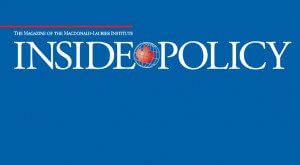 CapX deputy editor Rachel Cunliffe observes that after years of dreading cab rides on visits to New York, she was pleasantly surprised by the immaculate taxi and pleasant driver she encountered. Thank Uber for breaking the grinding New York taxi monopoly.
CapX deputy editor Rachel Cunliffe observes that after years of dreading cab rides on visits to New York, she was pleasantly surprised by the immaculate taxi and pleasant driver she encountered. Thank Uber for breaking the grinding New York taxi monopoly.
This article originally appeared on Capx.co.
By Rachel Cunliffe, Dec. 16, 2015
Oh, the joys of New York: sky-high tower blocks, legendary pizza, and the rudest taxi drivers on the planet.
On my previous trips to the Big Apple, my experience has been of drivers who jerk their way around corners, shout and swear at other vehicles, and behave like they are doing you a massive favour by allowing you into their shabby and odd-smelling car in the first place. Is it any wonder that Uber-founder Travis Kalanick chose New York as one of the cities to expand into?
So imagine my surprise when, arriving at JFK airport after a 7-hour journey, the driver of the yellow cab I hailed politely asked me how my flight had been. His car was immaculate, and his driving smooth but efficient. Rather than scrabbling for dollar bills at the bottom of my handbag, I was shocked to discover a working touch-screen and card reader in the backseat. And when I struggled with the instructions (Americans have yet to discover chip-and-pin, it seems), my driver helpfully took me through the payment process and wished me a pleasant stay in New York.
I knew that yellow cabs were meant to be able to take cards, but somehow the card reader had always seemed to be ‘broken’ on previous trips. As for politeness, the last driver I had bluntly refused when I asked for a receipt and acted thoroughly inconvenienced by having to give me change. This time, the drivers I had could not have been more courteous. And they even have a shiny ride-hailing app called Arro, which advertises “no surge pricing!” in happy letters (as though surge pricing is an evil trick Uber plays, rather than an effective use of market forces to get more cabs on the roads).
I’ve written before about how Uber in London offers a service that is in many ways superior to traditional taxis (cheaper, more accountable, with mobile payment). The same is true in New York, and New Yorkers are voting with their taxi dollars – low-cost UberX rides over the course of 2014 shot up by 450 percent. And just like their counterparts across the world (most notably in France), New York taxi drivers have protested the ‘unfairness’ of a competitor who can do their job better and more cheaply than they can.
But the grinding monopoly on New York’s taxi market, which stymies the supply of drivers in one of the world’s busiest cities, isn’t the fault of the drivers alone. The city’s bureaucratic medallion system dictates the number of drivers legally allowed to serve New York. Such medallions are, of course, hugely expensive – and by expensive, I mean upwards of $1 million.
Unsurprisingly, enterprising people trying to scrape a living in New York by working a classic newcomer job can hardly afford to buy one of the 13,500 medallions, even if one happened to be available at auction at the time. Instead, the vast majority of medallions are owned by companies, and drivers must pay to lease one in order to drive.
Enter Uber, and suddenly yellow cab drivers are realising maybe the fees aren’t worth it. Rather than pay thousands of dollars in fees to medallion holders, they could be driving for Uber, which takes 20 percent commission instead.
This has obviously not impressed the lucky owners of all those medallions. Gene Freidman, for example, owns over 1000 medallions, and helped push up the price by snapping them up any time one came up for auction, borrowing from credit unions to do so. Now that Uber has offered both consumers and drivers an alternative, the price of medallions is crashing (some can be bought for half of what they cost last year), and Freidman’s businesses can no longer make money off this rent-seeking practice. So now he’s hoping for a bailout from New York taxpayers, rather than accept competition in a market he monopolised for so long.
Others are similarly incensed. Cab medallion owners have filed a lawsuit against New York City regulators for allowing Uber into the market, claiming the city is responsible for the drop in medallion prices and leasing fees, and must compensate them for it. They state that:
“As set forth below, Defendants’ deliberate evisceration of medallion taxicab hail exclusivity, and their ongoing arbitrary, disparate regulatory treatment of the medallion taxicab industry, has and continues to inflict catastrophic harm on this once iconic industry.”
If suing the city because you don’t like the competition and demanding a bailout because your business is no longer profitable seems an overreaction, I suppose New Yorkers should be thankful drivers aren’t setting fire to cars and blockading the streets. And, indeed, while some have responded by attacking Uber in any way they can, others have wondered if maybe the burden is on them to up their game a little.
And that’s why there are suddenly apps for yellow cabs, working card readers, polite drivers and clean cars. It wasn’t city regulators who mandated that the service had to improve – it was ordinary New Yorkers, who simply took their business elsewhere. If anything, those invested in the classic yellow taxis should be thanking Uber for raising the standard in the “once iconic industry”.
I can only hope that the courts see the irony, and treat the medallion owner’s lawsuit with the ridicule it deserves.
Rachel Cunliffe is Deputy Editor of CapX.co.




